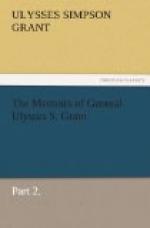All this time the troops we had been engaged with for four hours, lay crouched under cover of the river bank, ready to come up and surrender if summoned to do so; but finding that they were not pursued, they worked their way up the river and came up on the bank between us and our transports. I saw at the same time two steamers coming from the Columbus side towards the west shore, above us, black—or gray—with soldiers from boiler-deck to roof. Some of my men were engaged in firing from captured guns at empty steamers down the river, out of range, cheering at every shot. I tried to get them to turn their guns upon the loaded steamers above and not so far away. My efforts were in vain. At last I directed my staff officers to set fire to the camps. This drew the fire of the enemy’s guns located on the heights of Columbus. They had abstained from firing before, probably because they were afraid of hitting their own men; or they may have supposed, until the camp was on fire, that it was still in the possession of their friends. About this time, too, the men we had driven over the bank were seen in line up the river between us and our transports. The alarm “surrounded” was given. The guns of the enemy and the report of being surrounded, brought officers and men completely under control. At first some of the officers seemed to think that to be surrounded was to be placed in a hopeless position, where there was nothing to do but surrender. But when I announced that we had cut our way in and could cut our way out just as well, it seemed a new revelation to officers and soldiers. They formed line rapidly and we started back to our boats, with the men deployed as skirmishers as they had been on entering camp. The enemy was soon encountered, but his resistance this time was feeble. Again the Confederates sought shelter under the river banks. We could not stop, however, to pick them up, because the troops we had seen crossing the river had debarked by this time and were nearer our transports than we were. It would be prudent to get them behind us; but we were not again molested on our way to the boats.
From the beginning of the fighting our wounded had been carried to the houses at the rear, near the place of debarkation. I now set the troops to bringing their wounded to the boats. After this had gone on for some little time I rode down the road, without even a staff officer, to visit the guard I had stationed over the approach to our transports. I knew the enemy had crossed over from Columbus in considerable numbers and might be expected to attack us as we were embarking. This guard would be encountered first and, as they were in a natural intrenchment, would be able to hold the enemy for a considerable time. My surprise was great to find there was not a single man in the trench. Riding back to the boat I found the officer who had commanded the guard and learned that he had withdrawn his force when the main body




